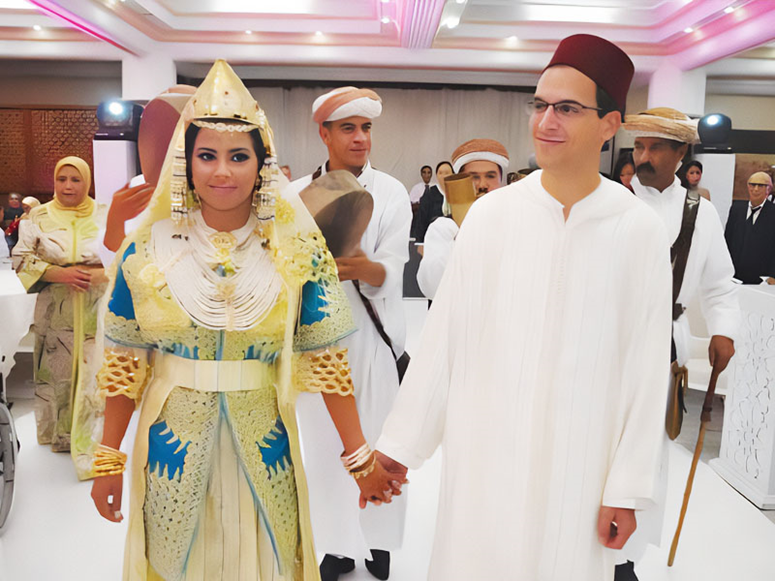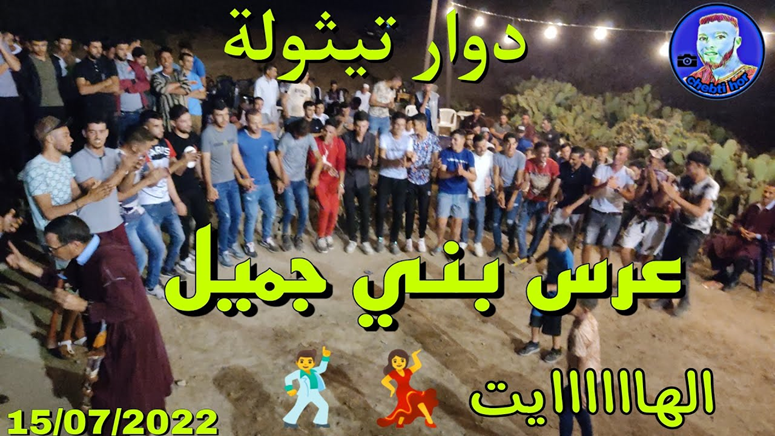wedding rituals of bani jamil, al hoceima province.. authentic customs and traditions of the tribes of the sanhaja region

Whenever summer comes, or else weddings are organized in Beni Jamil in the Al Hoceima province, where families seize the opportunity of the summer vacation and the arrival of expatriate families abroad to participate in the joy.
The summer season is the season of weddings, not only in Bani Jamil, but also in various parts of the Kingdom. During it, families meet on various social occasions, and during it ululation rises and villages and cities flood the atmosphere of celebration, bringing joy and joy to the souls.
The weddings of the Bani Jamil region, which belong to the Sanhaja tribes of the coast, carry endless customs and traditions within them, followed by people with precise details because they believe that violating any of them may cause unhappiness for the grooms. The various spaces of the house), purifying the crops and wheat, and preparing and welcoming the dusty alleys in front of the house. And all this takes place in the flavors of a collective celebration.

The wedding house witnesses a special atmosphere. Whenever a car was presented to the people of the ceremony carrying things related to joy such as the sacrifice, food, drinks and household supplies coming from the market, the women received it with ululation and “Prayers and Peace be upon the Messenger of God” and traditional songs of the locally known Sanhaja region, some of which are inherited and others are from The creativity of the moment and the occasion is repeated by the girls or women with a rhyme to express a specific sentimental topic, accompanied by a bandir made of goatskin on their hands, and usually one of the wedding people collects the bandir from every house in the village to prepare it in advance.
And the matter is not limited to the preparations only, as during the week preceding the wedding the house that will embrace the celebration of lights is also decorated with lights from every side, as well as the installation of the tent, or treasury as it is called locally, with the land in the place where the wedding will take place, and it is prepared to receive guests from Private, remote places. In neighboring villages, the date of the wedding is announced in the mosques by the imam, by publicly mentioning the wedding owner, his father’s name, and the place and day of the ceremony, in addition to the words of welcome from the father of the groom or one of the elderly men of his family.
Souad El Mourabit tells MAP that three days before the wedding, the groom's family wakes up early and greets the sunrise with ululations, songs and "Prayers and Peace be upon the Sealed Prophet" on the roof of the house, coinciding with the laying of a "white flag" of silk, symbolizing chastity and honor, along with The flag of Morocco is on a reed, decorated with roses before installing it on one side of the roof of the house, adding that when the setting of the sun approaches, the means of decoration are taken into the house, provided that they are put back in the same place in the morning and evening until the wedding day.
In her talk about the henna night tradition of the groom and the bride in this region, this woman from the village of Tedhmamin indicated that the couple are keen to wear white because it also symbolizes purity of bed and the desire for peace. A white dress covered with a green clasp, considering that it is a simple outfit in a session that is surrounded by the supplies placed on the “Taifur” table, including wax, sugar and roses.

During the henna tradition, women sing a group of songs expressing joy or sadness, and henna is placed in an embalmed form and not using inscriptions as is common in a number of regions of Morocco. Often, one of the bride’s sisters applies henna to the latter, while she sheds tears at the imminent separation of her family and the home of her parents. . As for the groom, he sits in a well-prepared place, in front of him is a group of his friends. The groom's sister comes forward with a member of her family, carrying a traditional basket full of flour with eggs and henna in the middle, with a group of girls performing religious praises and emotional songs that are usually repeated in the henna ceremony.
The atmosphere of the henna ceremony is not limited to that only, as the men, in turn, chant special songs for that, foremost of which is the song “The full moon has risen upon us.” It is present in henna, as it is carried by one of the bridegroom's sisters or one of his nieces or brothers, and no one has to touch it except for the very close family.
On the wedding day traditions, Malika, a village woman from Bani Jamil, says that on her wedding day, the bride walks from her house to the guest house, taking care to sing the songs of hospitality, provided that she goes after the afternoon and returns after dinner, and is greeted in the middle of the road. With candles, roses, the sound of guns, ghetto and drums, in a traditional performance called "Al-Hayt", which is one of the main traditions of the wedding in the Sanhaja region of the coast.

Regarding the sacrifice, Malika says that it is of a large type, such as calves, sheep and goats, explaining that all the people of the village temporarily stop their daily affairs, such as farming or harvesting, to help the family of the newlyweds in the slaughter process, so that the wedding becomes an affair that everyone contributes to its success, wishing for continued love and joy For the spouses, which are customs that involve beautiful and elegant human and social meanings.
During the ceremony, the groom is presented with monetary and in-kind gifts, which are called “Taoussa” by the residents of Bani Jamil. The gift-giver is keen to take them by car, announcing this with a sound alarm, and he is greeted with ululations, songs and chants by girls, children and men as well, provided that the groom mediates them and in front of him is his pregnant sister. "The flag", and if the gift is cash, it is attached to the groom, and everyone dances to the tunes and rhythm of the hit, and as for the women, they offer a basket of barley or flour, which is a must.
The rituals differ according to the capabilities of the two grooms. If the groom is well off, he brings to his wedding, which may last for two days, a famous choir or artists, and offers people various types of food, especially since the wedding in the Sanhaja region is still surrounded by an aura of interest.
The "Darat al-Shatih" dance prevails at weddings, where the Sanhaji women stand in a circular shape, and one of the girls or women performs a song, provided that everyone repeats it to the rhythm of the bandir. Any wedding is devoid of this custom.

Malika indicated that the ceremony ends with the groom putting henna again on his hand to bid farewell to his celibacy, and a lot of sugar is put in this henna in the hope of a happy and sweet marital life, then the spectacle continues with the heritage of the hit and the sanhaji dance, coinciding with gunpowder explosions from guns, as an expression of joy and happiness.
The couple bids farewell to the wedding venue towards the marital home in a "procession" led by a car decorated with roses and shiny ribbons. The couple wears an elegant suit and sits on the back chairs. The car is driven by one of the husband's relatives or acquaintances, and next to him is his sister carrying the "white flag." The newlyweds' car leads the procession. Car alarms go off, family waving flags and women ululating.
Source: websites

